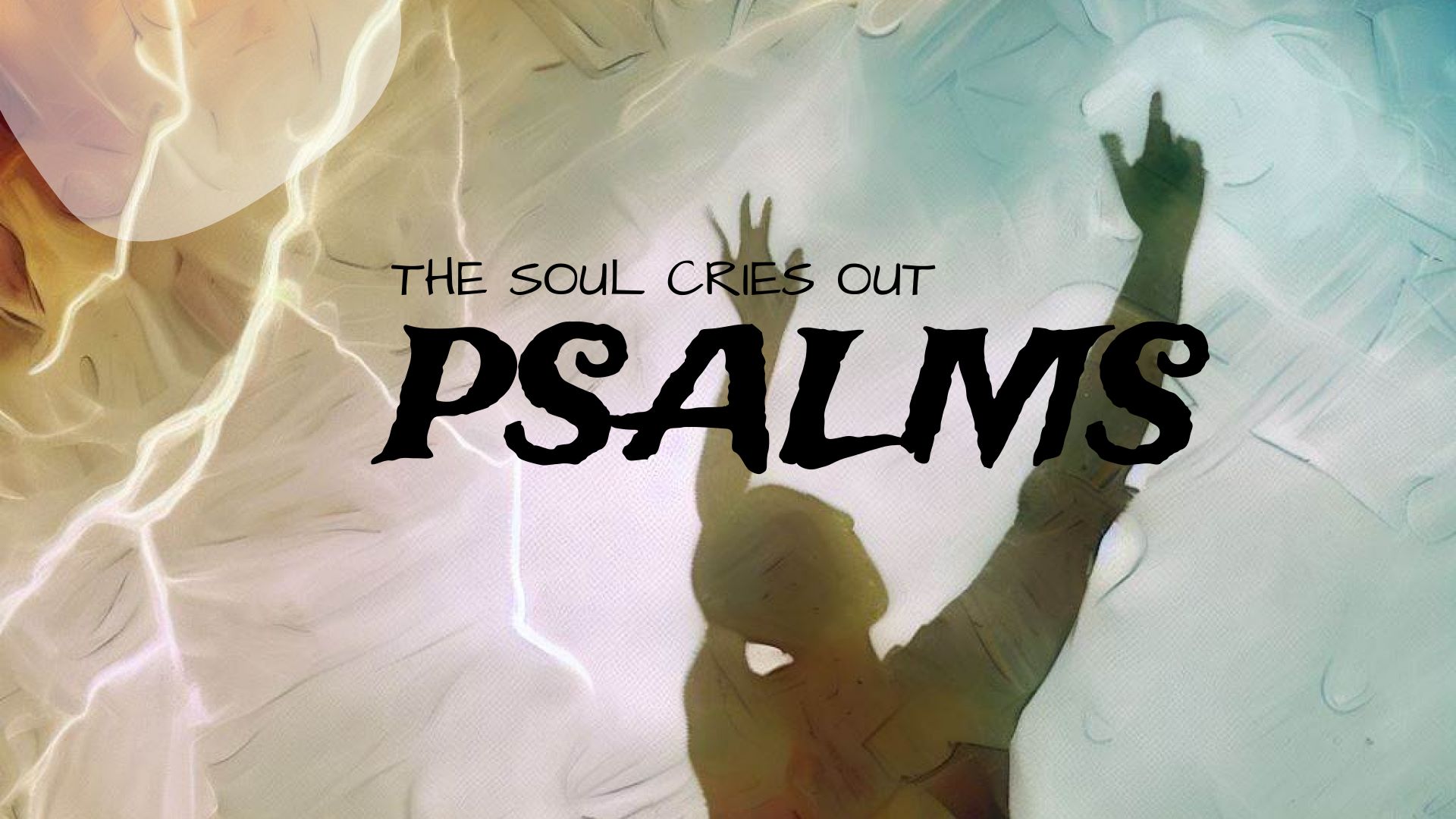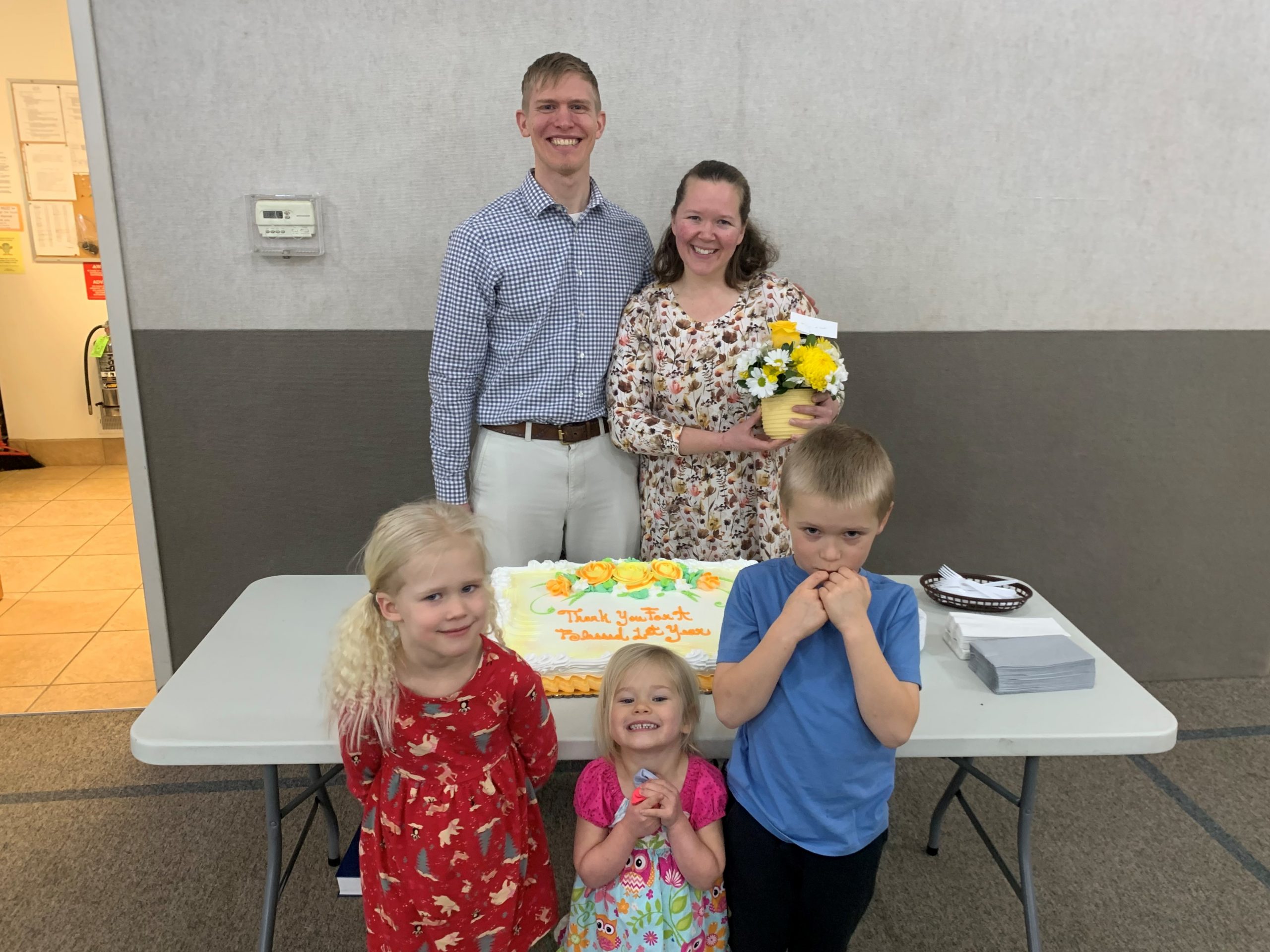The video had an issue during this service (it’s choppy), but the audio is clear throughout.
VBS 2024 Registration
This year’s Vacation Bible School theme is The Great Jungle Journey. It will take place Monday, Aug. 12–Friday, Aug. 16, 9 a.m.–noon. We hope you’ll join us! To register for VBS, please click here.
Church Vision Party
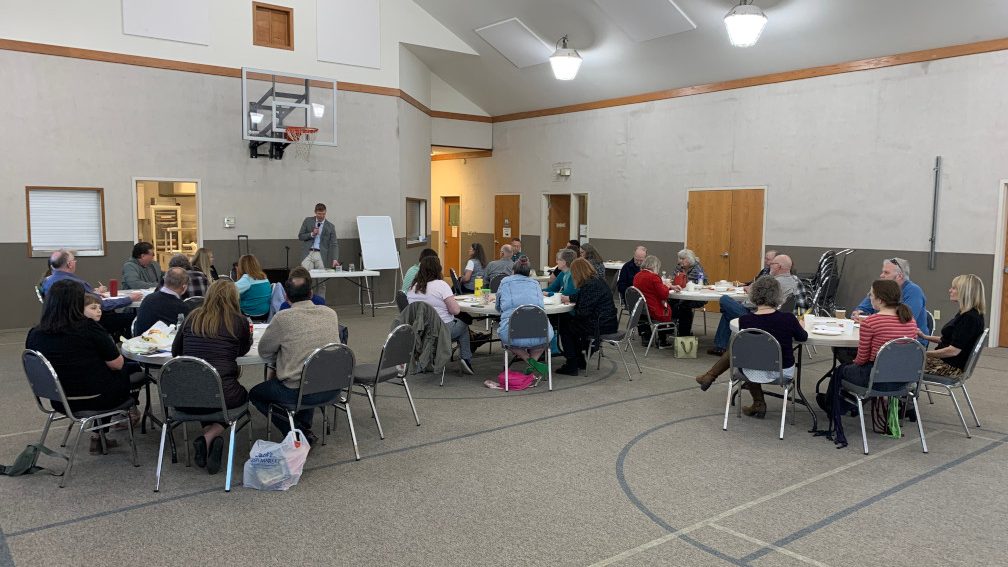
On April 7, 2024, we had a vision party to dream about what our church might look like in seven years. All 37 people there (how cool is that?) covered their tables with ideas written on bright sticky notes. Why don’t you try it? Here are the two questions:
- In seven years, what would your dream Sunday morning fellowship be like?
- In seven years, what characteristics will we see in people who attend our Sunday morning fellowship?
With all these people, there’s no surprise they came up with lots of ideas. Each table moved from generating to grouping ideas: what are the thoughts that many of us are thinking? Once everyone quieted down–which took some doing–each table shared a few of the ideas that they were excited about.
It was a good time of sharing ideas, collaborating, and discovering some of the big picture hopes living in our church. Hopefully in the coming days as we consider change, we will find these hopes to be big enough to carry us through. After all, Ephesians 3:20-21 gives us a big reason to hope:
20 Now to him who is able to do immeasurably more than all we ask or imagine, according to his power that is at work within us, 21 to him be glory in the church and in Christ Jesus throughout all generations, for ever and ever! Amen. (NIV)
Stay tuned for the results in the coming weeks. They will appear outside the office, online, and you’ll hear about them again and again. Because it’s important to consider where we are going.

Single in Christ, or just Single?
This last week someone raised an important question regarding singleness. In a past sermon on singleness, I called singleness a sort of spiritually elite category a couple time. Someone raised an important concern with such language to me. Given the history of the church, isn’t it problematic to elevate singleness as a spiritual category? After all, for much of church history the celibate priests, monks, and nuns were viewed as more spiritually significant than other people. Does calling singleness a spiritually elite state fall into the trap which the Reformation helped rescue us from?
This is a worthwhile question to consider. I’ll freely grant that spiritually elite may not be the best title to describe singleness. However, such a title does force a conversation for our time that is different than the historical concerns of the Reformation. Namely, the rise of singleness divorced from spiritual significance. Ponder with me this modern state of singleness.
Singleness in church history
It is always beneficial to be aware of the past. Up until the Reformation, it was self-evident to most people that the family of God consisted of two categories of unequal worth: the celibate clergy and the profane laity. The church taught—and people largely believed—that the single Christian clergy members had greater spiritual significance than the laity.
While it’s not completely clear how this situation developed, it started early in church history. Various strands of Greek philosophy and related religious expressions taught that material reality (i.e., bodies) was inherently bad and that spiritual reality was inherently good. Thus, avoiding certain aspects of creaturely reality—like sexual relations—was good. These very influential philosophies, combined with a few passages from Scripture, buttressed up the view that single church leaders and religious “professionals” were of greater value to God than the married laity.
Singleness in churches today
Spiritually elite may not be the best title for the singleness, but both Paul and Jesus do present singleness as a difficult state that has spiritual benefits. However, it is a pathway in life that won’t be easy or readily fit for most people. This teaching is most clear in 1 Corinthians 7, where Paul writes things like:
- 8 Now to the unmarried and the widows I say: It is good for them to stay unmarried, as I do. 9 But if they cannot control themselves, they should marry, for it is better to marry than to burn with passion.
- 28 But if you do marry, you have not sinned; and if a virgin marries, she has not sinned. But those who marry will face many troubles in this life, and I want to spare you this.
- 35 I am saying this for your own good, not to restrict you, but that you may live in a right way in undivided devotion to the Lord.
There is a lot to chew through in 1 Corinthians 7. But this much is clear: Paul presents singleness as a spiritually advantageous state.
Note very carefully that I’m talking about spiritual advantages not spiritual worth. Nowhere does the text tell us that being single is of more value to God than being married, spiritually or otherwise. In fact, the Bible tends to assume that marriage is the default pattern for humanity. But there are (potentially) spiritual advantageous to singleness.
Which leads to the key point for today: when it comes to singleness, the modern world doesn’t seem to be much like the ancient world.
Single in Christ ≠ plain single
The modern phenomenon of high rates of singleness outside and inside the church has very little to do with this the picture painted by both Paul and Jesus. Instead of men and women foregoing sexual relations in order to further devote themselves to Jesus, we see marriage rates plummeting in society, and also plummeting amongst those who follow Jesus. We see widespread practice of (and increasing acceptance of) premarital and extramarital sexual relations and pornography use among followers of Jesus. Paul writes in 1 Corinthians 7:9, “But if they cannot control themselves, they should marry, for it is better to marry than to burn with passion” (NIV). The data, both largescale and personal, suggests that many young adult followers of Jesus do indeed burn with passion, but increasingly don’t turn to marriage.
There’s a wealth of reasons and sociological explanations for all of this. Our chief interest is to illustrate that for many followers of Jesus today, singleness is quite different from what Paul and Jesus envisioned. Their teaching was a challenge in their day when marriage was normal and sexual immorality ran rampant. And it is still a challenge today when marriage seems to be faltering and sexual immorality still runs rampant.
In addition to the change in single life, we should not miss another way that our time and place is different from the past life of the church.
Single as normal, not a vocation
There are many single followers of Jesus who talk and write about the vocation of singleness as a way to make sense of their position in life. That is well and good. But I have yet to see someone stand up and argue that the best move in the spiritual life for everyone is to reject marriage and any forms of sexual relations. But, if you must get married, make sure you keep sexual relations to a minimum to avoid the taint of lust. We tend to see this view as self-evidently wrong. But that is essentially what St. Augustine taught about sexual relations. And he was by no means unique on the topic among early church leaders.
In my view, the greater threat to the church at this point is not the re-emergence of the teaching (among Protestants) that God prefers you to be single over married. The greater threat is that we will simply adopt the cultural slide towards a casual singleness. A singleness that is not spiritually engaged. A singleness that has little regard for God’s intended patterns of sexual relations. The greater threat to the church is acquiescence to the cultural norms of today, rather than those of 2,000 years ago.
Most people today assume that sexual relations are necessary for a flourishing life, finding it comedic and/or sad for an adult to not be sexually active. The boundaries of marriage are deemed irrelevant for pursuing such sexual relations. And increasingly, people in the church are in agreement with that.
Single in Christ
While spiritually elite may be bad language, something is required to reassert a biblical picture of singleness. Followers of Jesus can learn to pursue spiritual devotion to Jesus within singleness. And don’t get me wrong, a great many singles in fact do this. But the social norms and behavioral patterns of modern singleness are very far removed from a pursuit of godliness. To the degree that our version of singleness within the church looks like the rampant social singleness around us, to that degree we have lost the vision of what single in Christ means.
And that is where I end. Single in Christ. That is a name better than sons and daughters. And that is a name that is better, but far harder, than single in contemporary America.
Passport Kids – This Sunday!

Were early Christians Communist?
Acts 2:42—47 gives us a quick glance into the very earliest group of followers of Jesus. We see them living in an intense community with one another. As the text says,
42 They devoted themselves to the apostles’ teaching and to fellowship, to the breaking of bread and to prayer. 43 Everyone was filled with awe at the many wonders and signs performed by the apostles. 44 All the believers were together and had everything in common. 45 They sold property and possessions to give to anyone who had need. 46 Every day they continued to meet together in the temple courts. They broke bread in their homes and ate together with glad and sincere hearts, 47 praising God and enjoying the favor of all the people. And the Lord added to their number daily those who were being saved.
NIV
Hearing about this early church probably gets your blood pumping and excitement running. But… Wait… Hold on there. Sharing all possessions. Holding everything in common. Doesn’t that sound a lot like some type of commune, or maybe even communism? Were the early followers of Jesus communists? Should followers of Jesus today be communists?
Every so often the idea shows up that the early Christians were communists—or at least communistic—and that suggests we should be, too. It’s even here, in Wikipedia! Does this idea hold water? Let’s look briefly at the text and see what there is to see.
The (historically-specific) birth of the church
When we read the biblical text, it is helpful to remember that it happened in real history. The situation in Acts 2:42-47 was unique, and the unique factors are relevant. Let’s review what happened.
Pentecost, also known as the Feast of Weeks (see Leviticus 23:15-21), was a Jewish harvest festival held 50 days after Passover. By the time of Acts, this Festival of Weeks had morphed into a celebration of the giving of the Law. It was one of the three annual festivals for which Jewish people would travel from all over the known world to Jerusalem. On this particular Pentecost, probably sometime in May of AD 33,[1] God’s Spirit showed up with a roar. Jesus’ followers threw caution into the wind, preached the gospel boldly, and Jews from all over the known world responded, becoming followers of Jesus the Messiah.
The historical setting is important for grasping what is happening in Acts 2. People from the world over had traveled to Jerusalem on a religious pilgrimage. They were on vacation. They weren’t immigrating. When many non-residents of Jerusalem accept Jesus as messiah and stay there, the practical problem emerges of how to take care of everyone.
Cue spontaneous gifts of generosity. Widespread gifts of generosity, to such a degree that Luke characterizes it as:
44 All who believed were together and held everything in common, 45 and they began selling their property and possessions and distributing the proceeds to everyone, as anyone had need.
Acts 2:44-45 NET
This was clearly a communal way of supporting each other that is deeply foreign to most followers of Jesus today. But note how it is not communistic.
The early church versus Karl Marx
If we’re going to call them communistic, they are unlike any communism as it’s been practiced in the 20th-21st century. Notice that this is not a forced redistribution of wealth. It’s neither a profit-sharing endeavor nor the government forcibly controlling the means of production in society. It’s just people taking care of each other.
It’s organic, to use the criminally overused buzzword.
People shared what they had and what they could. People who had extra things, like the field that Barnabas sells (Acts 4:36-37), sold them to help other people. The fact that there are people who are “in need” makes plain that this “sharing everything” didn’t entail some sort of communal ownership of all the assets of each individual, otherwise, no one would be in need until the whole commune went bankrupt!
The actions of these early Christians have little in common with the government taking ownership of the means of production of wealth and sharing the profits in some sort of equal way (“all animals are equal; some animals are more equal than others”).
These early believers just were not concerned with addressing the questions which communism as a political theory tries to address at all. The sharing in the early church is more analogous to going and helping your neighbor move today than anything Karl Marx, Leon Trotsky, Joseph Stalin, Mae Zedong, or Xi Jinping were ever up to.
Watching the growth, not just the beginning
Pay special attention to the way this pattern of extreme giving and communal living falls by the wayside as Acts progresses. This first account of the church is of a group of people in transition. After being scattered by persecution (Acts 6), they settle down elsewhere and start making longer-term commitments to the place they are at. Never again do we get a report of communities divesting themselves of their assets and living in a commune. Why? Are these later churches not hearing the same gospel? Aren’t they receiving the same spirit? Or did the apostles change the message?
To be clear, generosity and devotion to caring for each other remain a focus. Paul writes:
28 The one who steals must steal no longer; instead he must labor, doing good with his own hands, so that he will have something to share with the one who has need.
Ephesians 4:28 NET
But we see that the communal zeal and living on the means at hand fall by the wayside as not essential to the gospel community the Holy Spirit births. Paul writes in 1 Thessalonians 3:10:
10 For even when we were with you, we used to give you this command: “If anyone is not willing to work, neither should he eat.”
NET
There is no freeloading, no taking care of people who simply won’t bother taking care of themselves. The gospel does not permanently remove people from the normal patterns of life, but redirects them on their way.
But, more to this point, working and sharing with one another remain a lasting mark of the church. Selling possessions and holding all things in common, however, don’t. Those are responses to an immediate concern at the birth of the church. While giving us a example to follow of passion, fervor, and generosity, they are not an economic or political theory about how to organize a local or national economy. Or even how followers of Jesus today should relate to those systems of politics and economics.
Community
The whole response of the proto-church in Acts is based on love and generosity and sacrifice for others. If that’s what you mean by communist, then you could call the early church communist. But a much better word for that is community. A community that loves and takes care of each other.
[1] Pentecost is 50 days (7 weeks and a day) after Passover. Passover was Nissan 14 on the year Jesus was crucified. This was either AD 30 or AD 33, with the later date probably more likely, though both dates have their advocates.
11 Cries of the soul from the book of Psalms
The writer Christian Wiman artistically captures one of the central dynamics of the book of Psalms, saying:
“Abundance and destitution are two facets of the one face of God, and to be spiritually alive in the fullest sense is to recall one when we are standing squarely in the midst of the other.”
My Bright Abyss: Meditation of a Modern Believer, 112
Journeying through the book of Psalms brings you through (1) seasons where everything is well in the world, (2) seasons where nothing is well, and (3) the time of emerging from seasons of distress into new seasons of joy. One reason why Psalms is so powerful is that not only does it speak to the seasons of life, but it speaks through them as well. That is, it teaches our souls how to cry out to God in all of life. Psalms emerges from the place of God’s people wrestling to know God and the result is more than just a bunch of poems. The psalms give a voice to the heart and teach the soul how to sing.
The journey
Our 11 weeks in the book of Psalms takes us only through a small portion of the wealth of the 150 different psalms found there.
But these 11 psalms capture some of the key ways that Psalms aims to shape our souls. And that is really important. Psalms is not in the Bible just to be neat poetry; rather, it is there to shape our souls so that they walk with and cry to God in tune with him.
Here are 11 ways your soul should cry out to God:
- Psalms 1-2: sing the song of blessed submission as you learn blessedness through submission to Torah (God’s word) and Messiah (God’s Anointed rescuer and ruler)
- Psalm 8: cry out God’s majesty as a director of the world in praising God
- Psalm 145: cry out with thankfulness for God’s robust and complex goodness in this world
- Psalm 86: praise God in the midst of the storms of life
- Psalm 88: learn to lament (it is worship, too)
- Psalm 79: cry out against brokenness with passion for God’s saving and judging acts
- Psalm 109: cry out in your anger toward God to find the stability and peace to speak in love towards your neighbor
- Psalm 23: praise God for the settled peace of being his—in the darkest valley or at the exalted banquet table
- Psalm 117: cry out the praises of God with such brilliance that others see his steadfast love is beautiful
- Psalm 136: worship God for the simple and life-alter reality: his enduring love is the greatest thing EVER
- Psalm 150: cry out to God because “Praise God” is the point of life
Leaving the Psalms
This brief sermon series in the book of Psalms barely touches at the riches therein. There is much more to learn.
Crying comes naturally to a baby. The baby feels a need and cries out over it. Crying at this basic, instinctual level is useful. But it is a crude and limited form of communication. As the baby grows up, crying in this instinctual way becomes more and more a limitation rather than a help. The child needs a more robust way of communicating the needs and desires of the soul.
In a similar way, crying out to God comes naturally to his children. But our instinctual cries stand in need of honing, shaping, and maturing as we come to better know God, his intentions, and this world he has created. Mine the Psalms. Meditate on the Psalms. More so than any other place in Scripture, here your soul is schooled in crying out to God in all of life.
Check out guidance here from Dr. Donald Whitney on praying the psalms and praying the Bible. This is life-changing guidance on prayer!
Shape it well through long years of steady observance and practice.
March 2023 Informer
February 2023 Informer
Celebrating One Year of Service
On January 15, 2023 we celebrated Pastor Nat Erickson’s one-year anniversary with First Baptist Church. The Erickson family moved into the church parsonage on January 20, 2022, and Pastor Nat preached his first service on Sunday, January 23. The church has been blessed by his leadership and guidance, and whole Erickson family’s presence and involvement in the life of the church. Thank you, Ericksons, for the blessings you have brought to us!
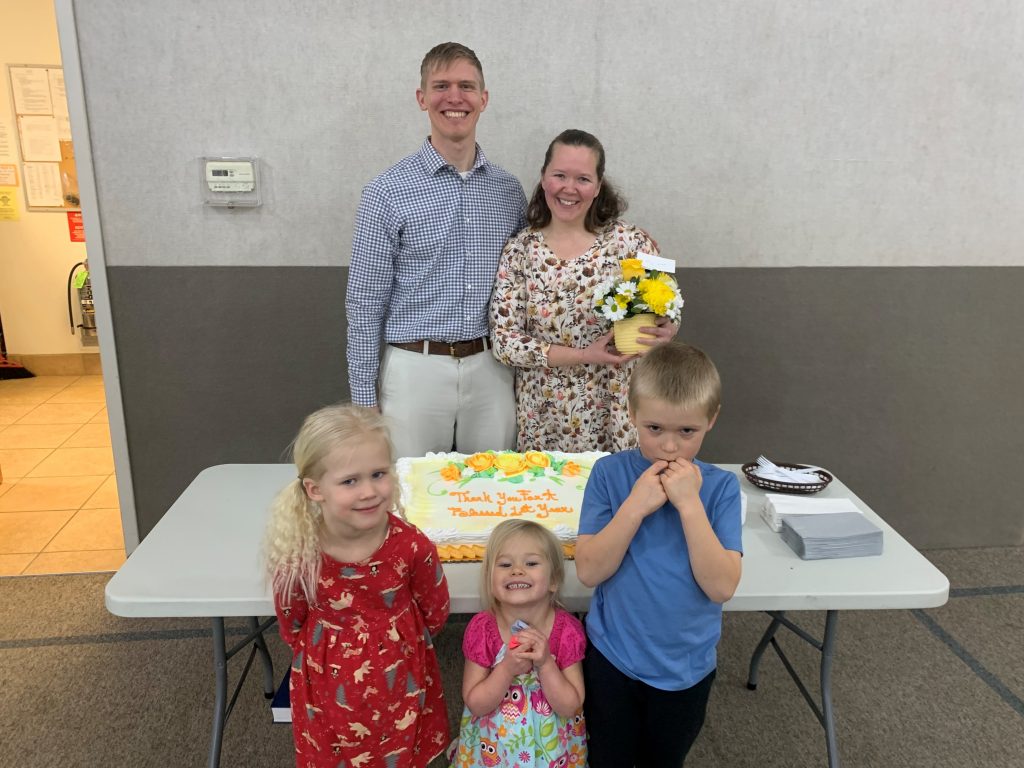
Erickson Family 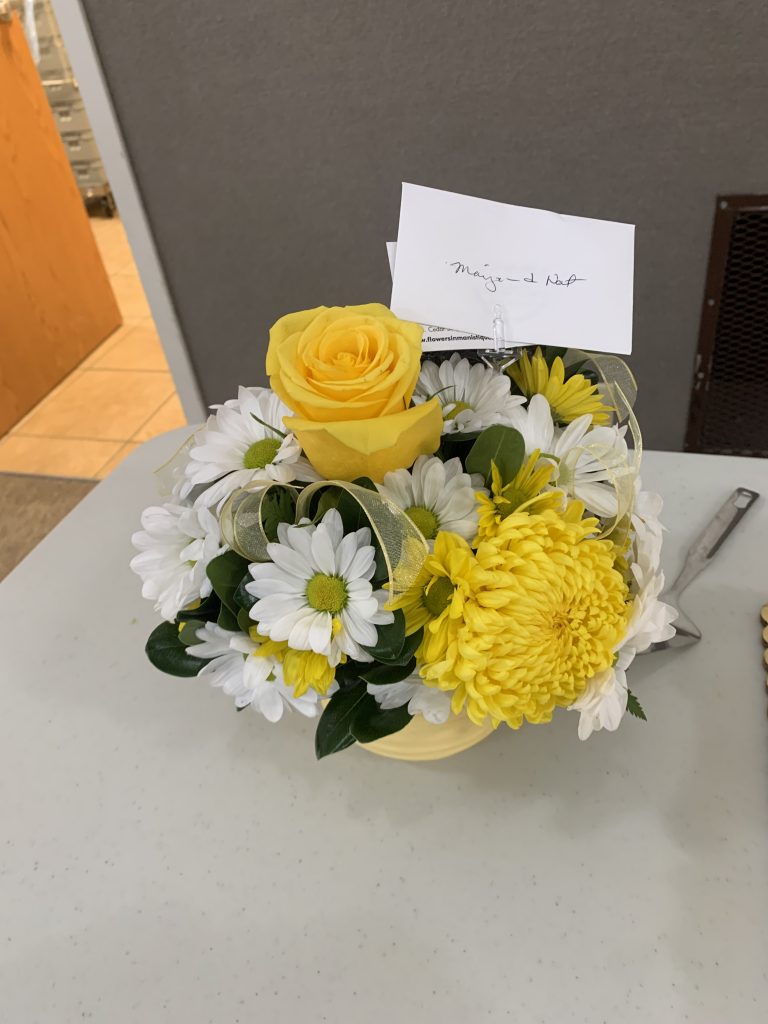
Flower Bouquet 
Cake



